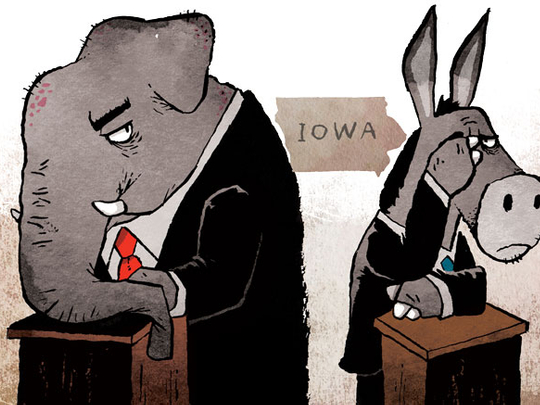
It was the corn state of Iowa that in 1976 gave an obscure governor from Georgia his springboard to the White House. Long before Jimmy Carter finished his solitary term, Iowa felt buyer’s remorse on the becardiganed mishap who had once stolen its heart. “Malaise” entered the US vocabulary. Today, it is making a comeback. Republicans blame it on Barack Obama.
Democrats pin it on everything but the president. Whatever the culprit, next month’s midterm vote is shaping into the malaise election. Iowa is once again spearheading the mood, which is a mix of fearful, bored and cynical. No resume better suits the fearful than that of Joni Ernst, Republican nominee for the seat vacated by Tom Harkin, the veteran Democratic senator. Not only is Ernst a military veteran. She commanded a company of 150 soldiers in Iraq and returned home without a fatality. Given Iowa’s outsized influence on the US presidential race — it holds the first caucuses — its voters are better informed than most about the multiple threats facing the US. Ernst’s backers have played heavily to those fears.
In one particularly scary television advertisement, Ernst seems the only force capable of stopping the terrorists smuggling Ebola across the US-Mexico border. Nice going for a 30-second spot. Control of the US Senate, which looks ever likelier to fall into Republican hands, could hinge on Iowa’s decision. Republicans need to win six seats to take control, one of which would have to be Iowa. Recent polls show Ernst with the edge. Her Democratic opponent is Bruce Braley, a former trial lawyer, whose campaign has been plagued by bad management. Sad to say, his campaign better reflects the electorate’s boredom. Having spent eight years as a Congressman in Washington, Braley finds it hard to distance himself from its dysfunction. He did himself few favours last month when he dismissed Chuck Grassley, Iowa’s other senator, as a farmer without a law degree.
Other than politicians and journalists, there are few more disliked professions than lawyers — and not many receive a higher rating than farmers, especially in Iowa. Ernst has made hay out of Braley’s gaffe. Braley himself comes from the small farming town of Brooklyn. But as one newspaper editor puts it: “He behaves as though he’s from Brooklyn, New York, not Brooklyn, Iowa.” Iowans do not like that. To add to his woes, Braley’s allies cannot seem to recall his name. Last week Michelle Obama referred to him as Bruce Bailey several times when standing next to him on the podium. Bill Clinton made the same mistake last month. “Sorry, it’s Braley,” Clinton corrected himself. “Not Bailey.”
With friends like this, What’s His Name is struggling. The third element is cynicism. Iowa did more than anywhere else to put Obama in the White House when it gave him a crushing victory over Hillary Clinton in January 2008. From then on, Obama used “Iowa” and “hope” interchangeably. Nowadays, Iowa is just another flyover state between Obama’s packed itinerary of fundraisers on each coast. So low are the president’s ratings that he is unwelcome in any of the embattled Senate races, Iowa included (the first lady’s ratings are far higher than her husband’s). In Kentucky, the Democratic candidate Alison Lundergran Grimes will not even disclose whether she voted for Obama in 2008 and 2012. Grimes cited her constitutional right to “secrecy at the ballot box”.
Braley went through a full televised debate last week without mentioning Obama’s name. Oddly enough, it just tripped off Ernst’s tongue. From an economic point of view, Iowa’s distemper may seem odd. More than half of Iowans believe their state is heading in the right direction — against barely a quarter of Americans. Bumper crops have given the state above-average growth at a time when the US economy is only slowly picking up speed. Iowans do not share the broader US distrust of trade deals. The state’s meat, dairy and poultry sectors are prolific exporters to China. Just before he became China’s President, Xi Jinping, stopped off in Iowa to acknowledge that. Yet, in spite of its success, Iowans are irritable with America’s politics-as-usual.
Whether on the well-heeled streets of Des Moines or in the depressed environs of Newton, a diverse cross-section of people voice a strikingly common refrain — the world seems increasingly menacing, yet Washington keeps getting caught unawares. US National polls now rank foreign policy above the economy — a return to voter priorities in George W. Bush’s first term. Rising unease knits together the return of the Russian bear, the beheadings in Syria and the second Ebola infection on US soil with profound scepticism about Washington’s ability to handle any of it.
The fact that the Secret Service took days to discover five bullet marks in the West Wing of the White House and let an armed man ride an elevator with the US president, reinforced that cynicism. Leaders do not lead.
Institutions repeatedly fail and no one seems to be held accountable. It may all sound a bit alarmist. But to Iowans, it is clearly real. In the state that gave birth to John Wayne, the demand for leadership is rising.
— Financial Times








